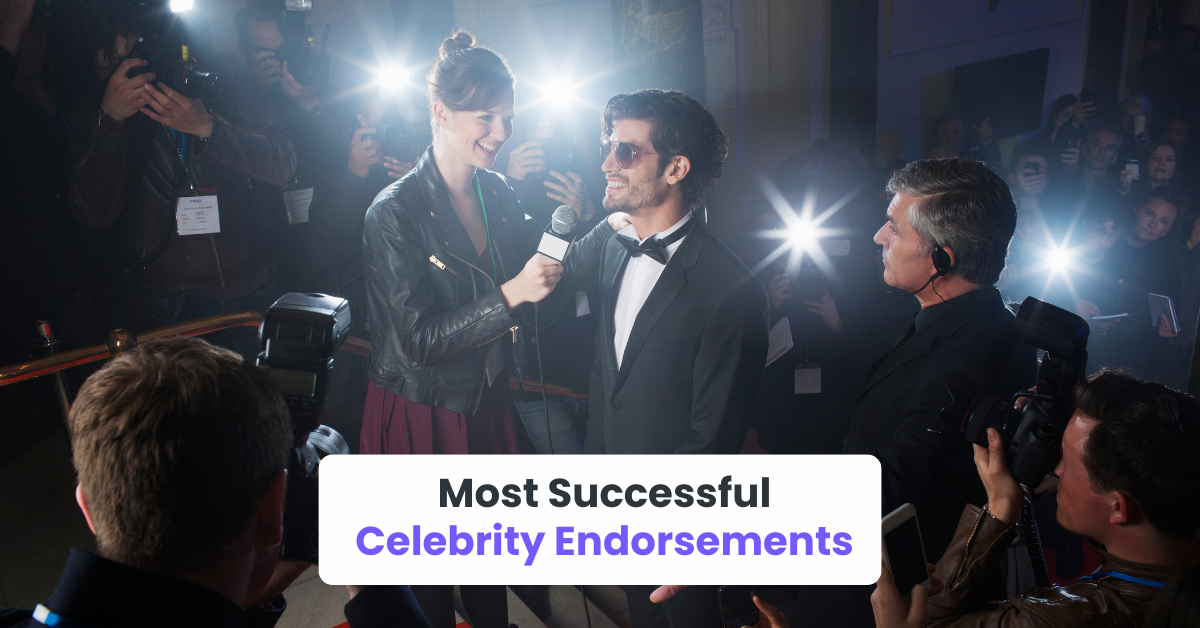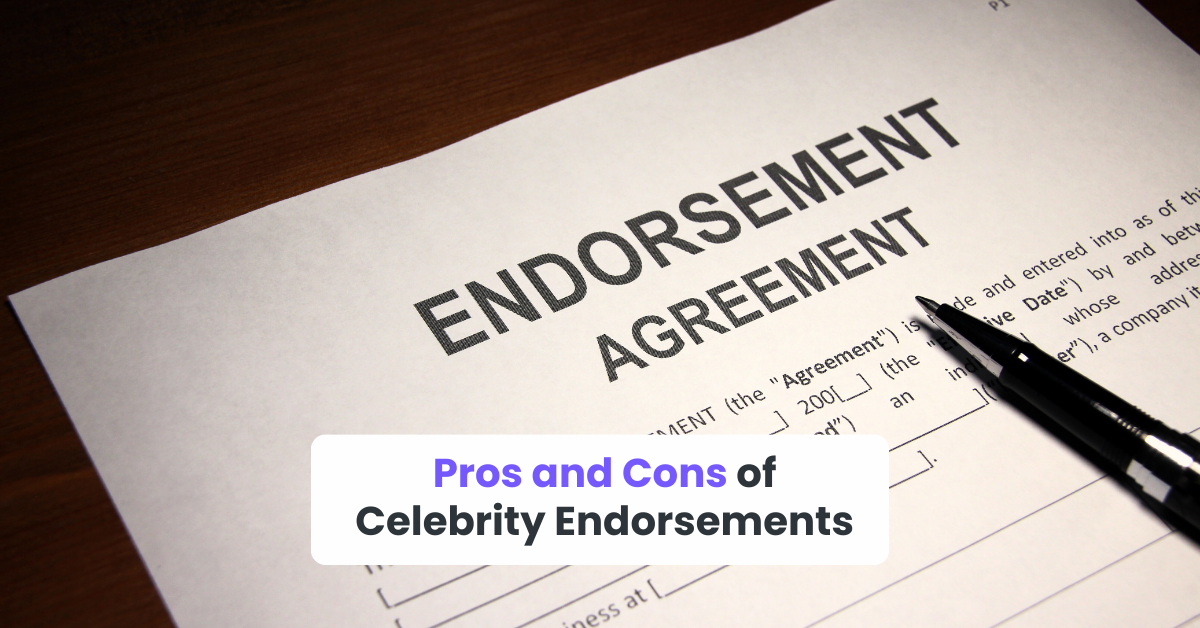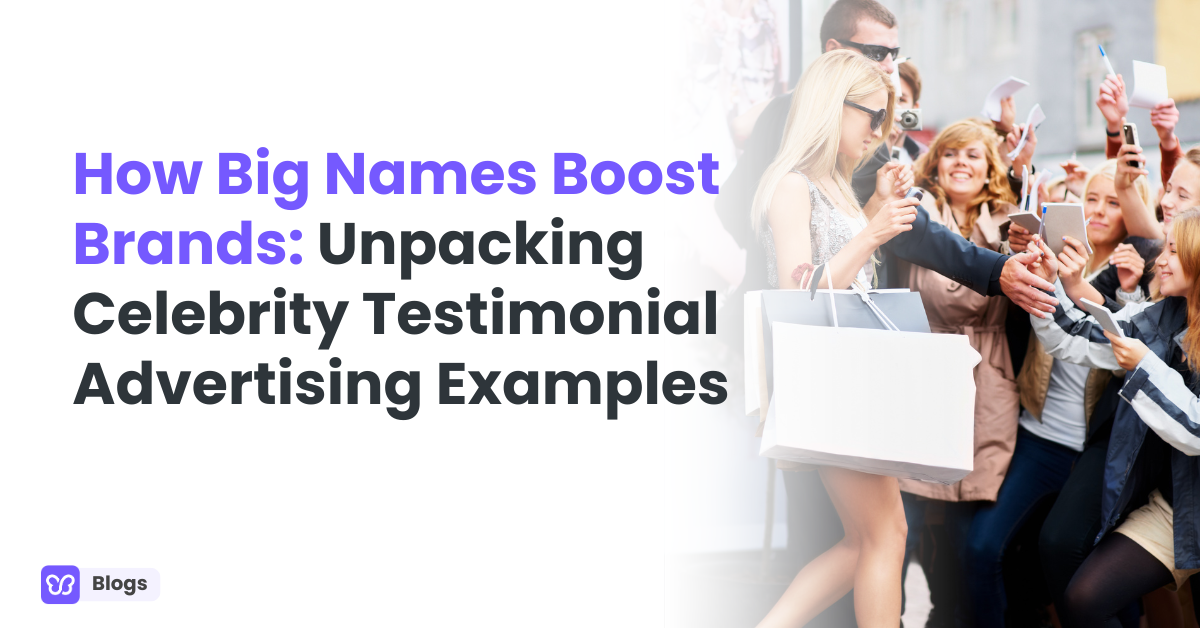Did you know that a celebrity endorsement can boost a brand's sales by an average of 4% almost overnight? That's the power of celebrity testimonial advertising!
This type of advertising involves well-known personalities to promote products, leveraging their fame and influence to reach larger audiences. In today's digital age, the impact of celebrity endorsements on brand visibility and credibility cannot be overstated.
This blog will dive deep into the world of celebrity endorsements, showcasing examples of the most successful campaigns, exploring why they worked, and discussing how you can leverage this strategy for your brand.
Get ready to uncover the secrets behind the glittering ads that win hearts and open wallets!
Understanding Celebrity Testimonial Advertising

Celebrity testimonial advertising is a marketing strategy where a well-known public figure endorses a product or service through various promotional channels. The goal is to leverage the celebrity's fame, credibility, and influence to create positive associations with the brand and persuade consumers to purchase the product or service.
The process involves selecting a celebrity whose image, values, and persona align with the target audience and brand identity, negotiating terms of the endorsement deal, creating marketing materials featuring the celebrity, and distributing the materials through various channels to reach the target audience.
Brands often track the effectiveness of celebrity endorsement through metrics such as sales data, brand awareness surveys, website traffic, and social media engagement. Celebrity endorsements can be highly effective in capturing consumer attention, building brand credibility, and driving sales, but they must be carefully considered to ensure long-term success in the market.
Celebrity endorsements are a marketing strategy that leverages the fame and influence of a famous public figure to promote a product or service. They differ from other advertising methods in several key ways.
Firstly, celebrity endorsements rely on the celebrity's credibility and influence to persuade consumers to buy a product or service. Secondly, celebrity endorsements often result in higher visibility and recognition for the brand due to the celebrity's existing fan base and media presence. Thirdly, celebrity endorsements can be significantly more expensive than other types of advertising, as brands must pay for the celebrity's endorsement fees, which can range from thousands to millions of dollars.
Lastly, celebrity endorsements come with the risk of association, where the celebrity's reputation directly impacts the brand. If the celebrity's image or behavior becomes tarnished, it can negatively impact the brand's perception and sales.
Lastly, celebrity endorsements are often used to appeal to a broad audience or specific demographic that follows the celebrity. Hence, brands must carefully consider their goals, target audience, budget, and potential risks when deciding whether to pursue a celebrity endorsement strategy.
Why Celebrity Testimonial Advertising?
The psychological impact that celebrity endorsements have on customer behavior makes them an effective advertising tool. They provide the brand legitimacy and credibility by acting as social proof. As a result of their widespread perception as authorities in their domains, celebrities evoke strong feelings in the hearts of fans who wish to adopt their ideals or way of life.
Their notoriety and media visibility draw attention and improve recall, increasing the salience of the product. The halo effect increases favorable sentiments and the possibility that a consumer will buy the endorsed product by attributing positive qualities linked with the celebrity to it.
A feeling of exclusivity and scarcity can be evoked by celebrity endorsements, which encourage buyers to buy the product in an effort to mimic the celebrity's lifestyle.
Studies have demonstrated that celebrity endorsements are a very successful kind of advertising, with an average 4% boost in sales and revenue. According to research that was published in the Journal of Advertising Research, celebrity endorsements can increase recall and brand awareness by up to 20%.
With 52% of customers believing celebrity endorsements, they can also have a favorable effect on how consumers perceive and trust a company. Celebrity endorsements also dramatically improve social media engagement; tweets mentioning celebrities receive 8% more interaction on Twitter than tweets about them.
Additionally, on the day of the announcement, the stock price of companies that announce celebrity endorsements rises by an average of 0.25%.
Most Successful Celebrity Endorsements

Celebrity endorsement campaigns have significantly impacted brands, generating buzz, increasing sales, and solidifying brand identity. Nike's "Just Do It" campaign with Michael Jordan, Pepsi's campaigns with Beyoncé and Britney Spears, and Dior's fragrance campaigns with Charlize Theron and Natalie Portman are some of the most iconic examples.
Jordan's collaboration with Nike in 1984 led to a surge in sales and the Air Jordan line becoming a cultural phenomenon. Pepsi's collaboration with Beyoncé in 2012 and Britney Spears in the early 2000s helped appeal to younger audiences and reinforce its image as a trendy and youthful brand.
Dior's fragrance campaigns with Charlize Theron and Natalie Portman showcased luxury and sophistication, while Samsung's collaboration with BTS expanded the brand's global reach and strengthened its image as a trendy and innovative brand.
Subway's campaign with Jared Fogle in the late 1990s and early 2000s was initially successful, as Fogle's story of losing weight through Subway sandwiches became synonymous with the brand's healthy image.
However, the success of celebrity endorsement and marketing campaigns also depends on factors such as brand alignment, authenticity, and the ongoing reputation of both the celebrity and the brand.
Several factors contributed to the success of these celebrity endorsement campaigns:
- Authenticity and Relevance: Celebrities whose persona and ideals coincide with the brand are frequently used in successful marketing initiatives. Michael Jordan's association with Nike and Dior's partnerships with Charlize Theron and Natalie Portman are two instances.
- Popularity and Cultural Impact: Well-known brand advocates include Beyoncé, Britney Spears, and BTS.
- Captivating Storytelling: Effective marketing strategies employ captivating storytelling to evoke strong feelings in their target audience. One instance is the Subway advertisement with Jared Fogle.
- Consistency and Longevity: Long-term collaborations are a common foundation for successful campaigns, since they provide consistent message and brand reinforcement.
- Creative Marketing Techniques: Companies employ creative marketing techniques to take advantage of celebrity endorsements through a variety of media.
- Positive Association and Perception: When celebrity and brand are associated positively, brand perception and trust are strengthened. This is the result of successful marketing.
Pros and Cons of Celebrity Endorsements

Celebrity endorsements in advertising come with their own set of advantages and disadvantages. Here are some of the Pros and Cons involving celebrity endorsement:
Pros:
- Increased Brand Visibility: Celebrities attract attention and generate buzz, increasing brand visibility.
- Enhanced Credibility: Celebrity endorsements lend credibility to the brand, especially if seen as an expert or respected figure.
- Positive Association: Celebrity endorsements create positive associations in consumers' minds, leading to more favorable attitudes towards the brand.
- Expanded Reach: Celebrities have large fan bases, allowing brands to reach a broader audience and potentially attract new customers.
- Emotional Connection: Celebrities can evoke emotions and connect with consumers on a personal level, making them more likely to remember and engage with the brand.
Cons:
- High Costs: Hiring celebrities for endorsements can be expensive, especially for brands with limited budgets.
- Risk of Overexposure: Overexposure of a celebrity in multiple endorsements or controversies can diminish the endorsement's effectiveness and harm the brand's image.
- Loss of Control: Brands may lose control over the narrative and messaging of their campaigns when relying on celebrities.
- Lack of Authenticity: If the celebrity's endorsement does not align with their personal brand, it can backfire and damage the brand's credibility.
- Association with Controversy: Celebrity endorsers involved in scandals or controversies can reflect negatively on the brand and lead to a loss of consumer trust.
- Limited Long-Term Impact: Celebrity endorsements may generate short-term attention and sales spikes, but their long-term impact on brand loyalty and consumer behavior may be limited.
The visibility, legitimacy, and sense of connection of a business with consumers can all be greatly increased by celebrity endorsements. They draw interest, bolster credibility, and connect with certain target markets.
Celebrities have the power to arouse feelings and build emotional bonds, which strengthens brand loyalty. They can establish a distinctive position in the market, set brands apart from rivals, and boost social media interaction.
Customers' opinions of a brand might be influenced by its celebrity affiliation, which strengthens its distinctiveness. However, when choosing celebrity endorsers for ads, firms need to take into account aspects like authenticity, brand fit, and possible hazards.
In the entertainment industry and music industry general, brand visibility and sales can be greatly increased by celebrity endorsements.
Although celebrity endorsements have advantages for brands, there are drawbacks as well. Reputational harm, excessive exposure, issues with authenticity, cost overruns, loss of control, and limited long-term effects are a few of these.
Brands should choose celebrities with a clean public image, minimize overexposure, thoroughly investigate possible endorsers, and make sure the endorsement stays relevant and engaging to their target audience in order to avoid these.
Along with setting clear expectations and terms with endorsers, they should also think about other ways to be compensated, set clear rules for their conduct, and develop clear communication channels.
In order to optimize the enduring effects of celebrity ads, organizations had to incorporate celebrity endorsements into more comprehensive marketing tactics and allocate resources towards cultivating genuine connections with potential customers.
How to Choose the Right Celebrity for Your Brand
Brands should take into account a number of criteria when choosing a celebrity to endorse. These include market trends and cultural relevance, brand alignment and fit, popularity and reach, credibility and trustworthiness, longevity and reliability, and relevance to the intended audience.
Relevant celebrities are more well-liked and have higher levels of engagement, whereas credible celebrities are seen as real and reliable. Additionally, brands have to make sure the celebrity fits in with the brand's positioning, identity, and values.
Reliability and longevity are essential because steady public personas of celebrities offer marketing campaigns coherence and continuity. It's also critical to keep up with cultural changes and market trends to make sure the celebrity endorsement stays relevant and appeals to consumers.
To ensure a successful endorsement campaign, brands must define their brand identity, research potential celebrities, identify key attributes, evaluate celebrity fit, consider audience perception, collaborate on campaign development, maintain consistency in messaging, tone, and imagery, and monitor and adapt.
Defining the brand identity involves understanding the next brand ambassador's values, positioning, target audience, and desired brand image throughout. Researching potential celebrities involves assessing their image, values, and public persona, as well as their previous endorsements, social media activity, and public appearances.
Identifying key attributes, such as innovation, authenticity, sustainability, or luxury, is essential for the brand's identity and messaging. Celebrity fit is evaluated by considering factors such as lifestyle, personality, interests, and public image.
Choosing a celebrity who resonates with the target audience and can effectively communicate with them is crucial. Collaborating on campaign development ensures the celebrity's image and personality are integrated seamlessly with the brand's messaging and creative direction.
Consistency in messaging, tone, and imagery across all aspects of the campaign is essential. Continuously monitoring consumer feedback and brand perception throughout the campaign ensures alignment and success.
Future of Celebrity Endorsements
Influencer marketing is a growing trend in celebrity endorsements, with brands increasingly partnering with micro-influencers and niche content creators. This allows for more targeted and authentic endorsements.
The focus is on diversity and inclusion, with brands seeking to partner with celebrities representing diverse backgrounds, identities, and experiences. Virtual influencers, computer-generated characters with large social media followings, are becoming popular for endorsements, offering brands a unique opportunity to engage with younger audiences.
Purpose-driven endorsements are becoming more popular, as consumers are drawn to brands and celebrities who support social causes. The integration of Augmented Reality and Virtual Reality (VR) technology is also enhancing consumer engagement through immersive experiences.
Personalized endorsements and custom content are becoming more popular, with brands leveraging data analytics to identify relevant influencers and create targeted campaigns.
Authenticity and transparency are key priorities, as consumers value genuine connections and are quick to detect inauthentic celebrity endorsements work well. Performance-based metrics are being used to measure the effectiveness of celebrity endorsements, focusing on outcomes like sales lift, brand sentiment, and return on investment.
Influencer marketing is a growing trend in celebrity endorsements, with brands increasingly partnering with micro-influencers and niche content creators. This allows for more targeted and authentic endorsements.
The focus is on diversity and inclusion, with brands seeking to partner with celebrities representing diverse backgrounds, identities, and experiences. Virtual influencers, computer-generated characters with large social media followings, are becoming popular for endorsements, offering brands a unique opportunity to engage with younger audiences.
Purpose-driven endorsements are becoming more popular, as consumers are drawn to brands and celebrities who support social causes. The integration of Augmented Reality and Virtual Reality (VR) technology is also enhancing consumer engagement through immersive experiences.
Personalized endorsements and custom content are becoming more popular, with brands leveraging data analytics to identify relevant influencers and create targeted campaigns. Authenticity and transparency are key priorities, as consumers value genuine connections and are quick to detect inauthentic endorsements.
Performance-based metrics are being used to measure the effectiveness of celebrity endorsements, focusing on outcomes like sales lift, brand sentiment, and return on investment.
That's How Big Names Boost Brands
Celebrity endorsements in marketing have the power to raise a brand's profile, reputation, and level of customer trust. Considerations include audience perception, brand alignment, popularity, credibility, and relevancy.
Increased reach, credibility, emotional connection to customers, differentiation, and social media amplification are among the advantages for brands. Reputational harm, excessive exposure, issues with authenticity, cost overruns, loss of control, and limited long-term effects are some potential hazards.
Celebrity endorsements have changed as a result of social media's ability to facilitate direct audience involvement, authenticity, real-time feedback, ease of content production and dissemination, increased worldwide reach, evolution of formats and trends, and encouragement of user-generated content.
In the digital age, marketers may promote business growth and optimize the efficacy of their celebrity endorsement campaigns by strategically evaluating critical elements and utilizing various social media platforms.
A potent marketing tactic that has the potential to greatly impact customer behavior, brand impression, and business results is celebrity endorsements. Strategically implemented, they have the potential to boost brand awareness, legitimacy, and confidence—thereby stimulating sales and cultivating brand allegiance.
They do, however, carry certain risks, including those related to authenticity, relevance, and brand values alignment. The emergence of social media has brought about a transformation in the realm of celebrity endorsements, providing novel avenues for immediate, genuine, and quantifiable interaction.
The ability of celebrity endorsements to grab customers' interest, arouse feelings, and forge deep ties is what gives them their power. A planned approach, sincere brand-celebrity alignment, and a dedication to provide value are necessary for success best celebrity ads.



 Trisha Ballesteros
Trisha Ballesteros

